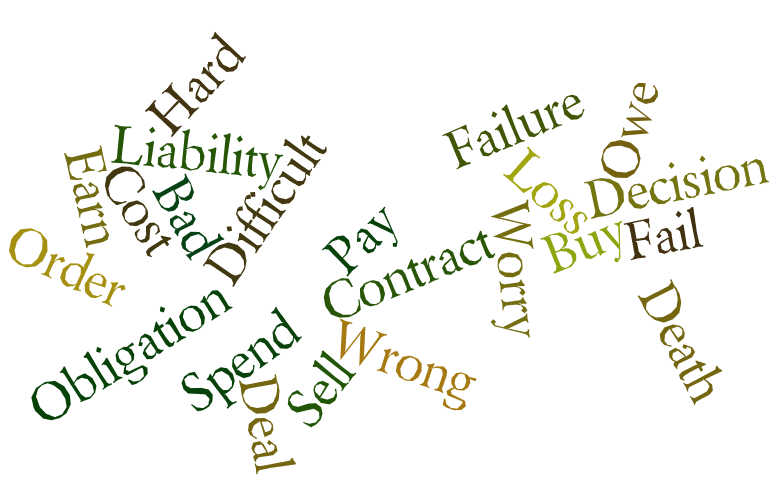Tag: word choice
Forget the eye of newt. Put your black cat up for adoption. The wise know that the real magic is in words.
Not just any words — the right words.
At least, that is what I gather from copywriter Sarah Jo Wood of Evolving Advisors Inc. in Toronto, Ontario. She was kind enough to send me a list of words to avoid. Apparently, readers who see these words run screaming into the night, or at least shudder and turn away.
Here are the words of woe that she says can jinx your writing:
See how I can use those words, underlining them as I go:
As a business and trial lawyer writing on business and law, it is hard to see how I can meet my obligation to my readers without using those “wrong” words. Suppose I want to analyze a difficult decision to sign a contract to buy or sell in order to earn. I must consider what may worry the business person more than death — failure. A business deal gone bad can cost money; what you owe you usually must pay. There are ways to lower the risk of liability and loss, but worry is a cost of doing business. If you spend your life in a fantasy you should expect to fail.
Maybe that paragraph sounds negative, but could I say those things without most of those words?
That said, Sarah does have a point. Words have more than their literal meaning. They have associations and implications, mood and tone. They pick things up from the company they keep like butter can pick up tastes in a refrigerator.
Mark Twain famously said, “The difference between the right word and the almost right word is the difference between lightning and a lightning bug.”
I have to admit that looks nothing like a bug of any kind.
In advertisements people never “spend,” they “invest.” Of course, vacation trips and other luxuries are consumption, not investment, but the advertisers use the more appealing word anyway. I suspect they know what they are doing.
Suppose you want to influence your audience’s attitude towards a man. There are many ways you could accurately refer to him. Depending on your audience and what attitude you want, you could call him the biker, the Harley rider, the motorcyclist, Dr. Maniple, the pediatrician, the doctor, the baby doctor, and so on.
For an average middle-class audience the words from “Dr. Maniple” are more positive than “biker” or “Harley rider.” The word “pediatrician” could come across as stuffy, pretentious, or confusing to some audiences but clear and appealing to medical people. Those who have had good dealings with Harley-Davidson motorcyclists might find “Harley rider” very positive.
These differences can matter in court, in novels, in advertising, in fact in any communication.
Even synonyms do not mean exactly the same thing. For example, someone who is “prosperous” probably does not have as much as someone who is “wealthy.” Haute cuisine is not described as “yummy.” A “lovely” woman is more refined than a “hottie.”
Consider word choice and business names.
“Ben & Jerry’s” seems friendlier and less corporate than “A Division of Unilever.” Ben & Jerry’s now actually is a division of Unilever but does not sell Unilever ice cream. It just would not sound as good as Ben & Jerry’s.
What about a string-of-initials name? The idea is that since IBM is a famous corporate giant your small business startup will impress with a name like RKZZP Corp. But such a name can make your branding efforts harder. Who can even remember “RKZZP Corp.”?
The string-of-initials name does not make the famous corporate giant impressive; the fact of being a famous corporate giant lets it get away with using a dud name.
Word choice matters but it is not all that matters. Shakespeare, the great master of word choice, wrote “a rose by any other name would smell as sweet”. I would add, an “unauthorized effluent release” would smell as bad.
But put the right words with the right substance, and now you have magic.



